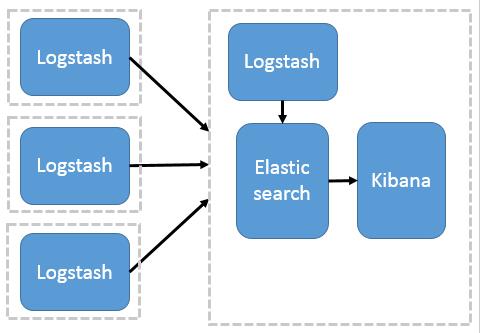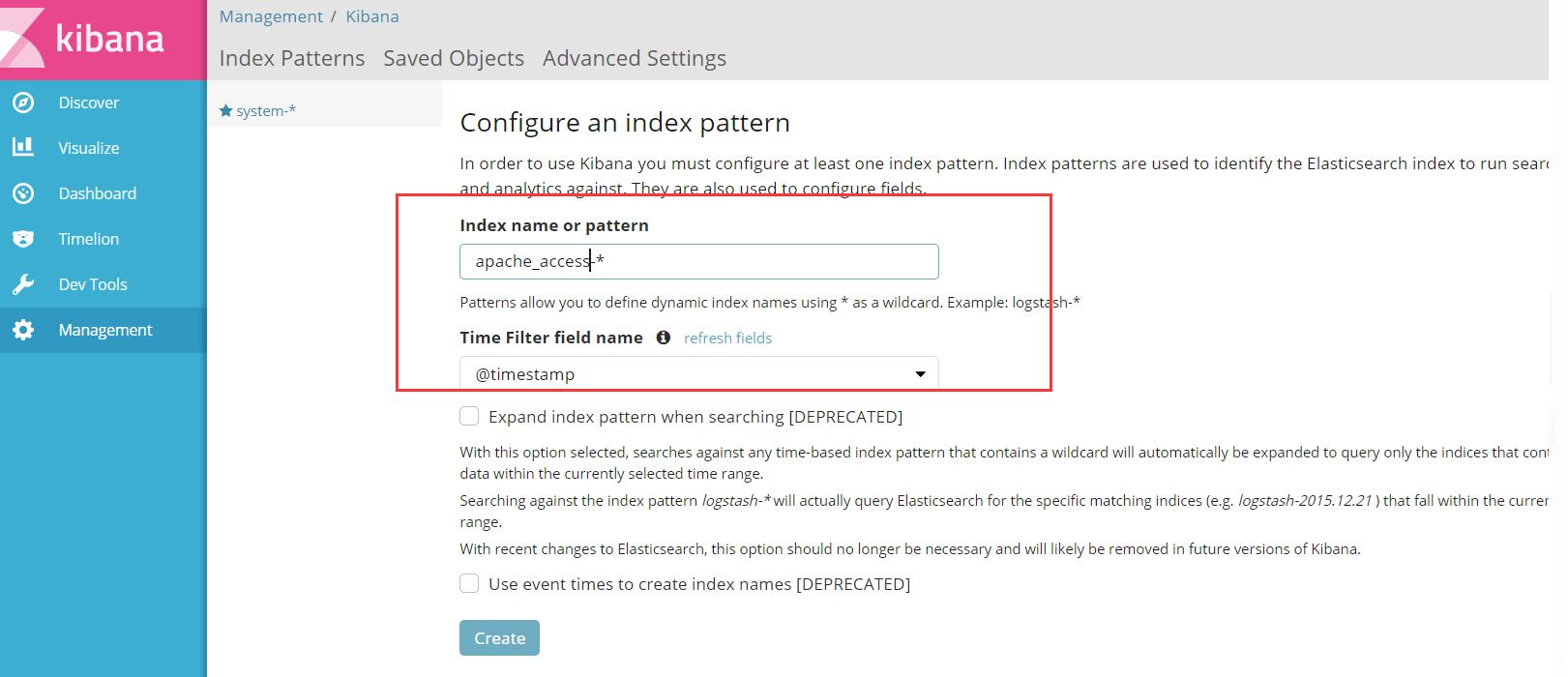一篇好文教你ELK日志分析系统快速入门!注意点赞收藏
Posted 28线不知名云架构师
tags:
篇首语:本文由小常识网(cha138.com)小编为大家整理,主要介绍了一篇好文教你ELK日志分析系统快速入门!注意点赞收藏相关的知识,希望对你有一定的参考价值。

前言:为什么用到ELK?
一般我们需要进行日志分析场景:直接在日志文件中 grep、awk 就可以获得自己想要的信息。但在规模较大的场景中,此方法效率低下,面临问题包括日志量太大如何归档、文本搜索太慢怎么办、如何多维度查询。需要集中化的日志管理,所有服务器上的日志收集汇总。常见解决思路是建立集中式日志收集系统,将所有节点上的日志统一收集,管理,访问。
一般大型系统是一个分布式部署的架构,不同的服务模块部署在不同的服务器上,问题出现时,大部分情况需要根据问题暴露的关键信息,定位到具体的服务器和服务模块,构建一套集中式日志系统,可以提高定位问题的效率。
一个完整的集中式日志系统,需要包含以下几个主要特点:
- 收集-能够采集多种来源的日志数据
- 传输-能够稳定的把日志数据传输到中央系统
- 存储-如何存储日志数据
- 分析-可以支持 UI 分析
- 警告-能够提供错误报告,监控机制
ELK提供了一整套解决方案,并且都是开源软件,之间互相配合使用,完美衔接,高效的满足了很多场合的应用。目前主流的一种日志系统。
一、ELK简介:
ELK是三个开源软件的缩写,分别表示:Elasticsearch , Logstash, Kibana , 它们都是开源软件。新增了一个FileBeat,它是一个轻量级的日志收集处理工具(Agent),Filebeat占用资源少,适合于在各个服务器上搜集日志后传输给Logstash,官方也推荐此工具。
Elasticsearch是个开源分布式搜索引擎,提供搜集、分析、存储数据三大功能。它的特点有:分布式,零配置,自动发现,索引自动分片,索引副本机制,restful风格接口,多数据源,自动搜索负载等。
Logstash 主要是用来日志的搜集、分析、过滤日志的工具,支持大量的数据获取方式。一般工作方式为c/s架构,client端安装在需要收集日志的主机上,server端负责将收到的各节点日志进行过滤、修改等操作在一并发往elasticsearch上去。
Kibana 也是一个开源和免费的工具,Kibana可以为 Logstash 和 ElasticSearch 提供的日志分析友好的 Web 界面,可以帮助汇总、分析和搜索重要数据日志。
Filebeat隶属于Beats。目前Beats包含四种工具:
-
- Packetbeat(搜集网络流量数据)
- Topbeat(搜集系统、进程和文件系统级别的 CPU 和内存使用情况等数据)
- Filebeat(搜集文件数据)
- Winlogbeat(搜集 Windows 事件日志数据)
二、ELK简单架构图

三、日志服务器的优缺点
优点:
- 提高安全性
- 集中存放日志
缺点:
- 对日志的分析困难
3.1、Logstash管理包含四种工具
- Packetbeat ( 搜集网络流量数据)
- Topbeat(搜集系统、进程和文件系统级别的CPU和内存使用情况等数据)
- Filebeat (搜集文件数据),相较于Logstash是轻量级工具
- Winlogbeat (搜集Windows事件日志数据)
3.2、日志处理步骤
- Logstash收集AppServer产生的Log,并将log进行集中化管理
- 将日志格式化(Logstash) 并存放到ElasticSearch集群中
- 对格式化后的数据进行索引|和存储( Elasticsearch)
- Kibana则从Es集群中查询数据生成图表,再返回给browsers
四、Elasticsearch的基础核心概念
- 接近实时(NRT)
elasticsearch是一个接近实时的搜索平台,这意味着,从索引一个文档直到这个文档能够被搜索到有一个轻微的延迟(通常是1秒)
- 集群(cluster)
一个集群就是由一个或多个节点组织在一起,它们共同持有整个的数据,并一起提供索引和搜索功能。其中一个节点为主节点,这个主节点是可以通过选举产生的,并提供跨节点的联合索引和搜索的功能。集群有一个唯一性标示的名字,默认是elasticsearch
集群名字很重要,每个节点是基于集群名字加入到其集群中的。因此,确保在不同环境中使用不同的集群名字。一个集群可以只有一个节点。强烈建议在配置elasticsearch时, 配置成集群模式。es 具有集群机制,节点通过集群名称加入到集群中,同时在集群中的节点会有一个自己的唯一 身份标识(自己的名称) .
- 节点(node)
节点就是一台单一的服务器,是集群的一部分,存储数据并参与集群的索引和搜索功能。像集群一样,节点也是通过名字来标识,默认是在节点启动时随机分配的字符名。当然,你可以自己定义。该名字也很重要,在集群中用于识别服务器对应的节点。
- 索引
一个索引就是一个拥有积分相似特征的文档的集合,由一个名字来标识(必须全部是小写字母),索引相对于关系型数据库的库
- 类型
在一个索引种,可以定义一种或多种类型,一个类型是索引的一个逻辑上的分类/分区,其语义完全自定义。类型相对于关系型数据库的表
- 文档
一个文档是一个可被索引的基础信息单元,文档相对于关系型数据库的列
- 分片和副本
①分片的主要原因
a:水平分割扩展、增大存储量
b:分布式并行分片操作,提高性能和吞吐量
②副本的主要原因
a: 高可用性,以应对分片或节点故障
b: qps性能、增大吞吐量,搜索可以并行在所有副本上执行
③分片和副本的数量可以在索引创建的时候指定,在索引创建之后,可以动态地改变副本的数量,但是不能改变分片的数量
五、Logstash介绍
Logstash由JRuby语言编写,基于消息(message-based) 的简单架构,并运行在Java虚拟机(JVM)上。LogStash可配置单一的代理端(agent) 与其它开源软件结合,以实现不同的功能。
Logstash的理念很简单,它只做3件事情:Collect:数据输入、Enrich:数据加工,1如过滤,改等、Transport:数据输出( 被其他模块进行调用)
1. logStash的主要组件
①:Shipper(日志收集者):负责监控本地日志文件的变化,及时把日志文件的最新内容收集起来。通常,远程代理端(agent)只需要运行这个组件即可;
②:Indexer(日志存储者):负责接收日志并写入到本地文件。
③:Broker(日志Hub):负责连接多个Shipper和多个Indexer
④:Search and Storage(搜索和存储器):允许对事件进行搜索和存储;
⑥:Web Interface(web界面端):基于Web的展示界面
2. LogStash主机分类
①:代理主机(agent host) :作为事件的传递者(shipper),将各种日志数据发送至中心主机;只需运行Logstash代理( agent)
②:程序中心主机(central host) :可运行包括中间转发器(Broker) 、索引器(Indexer) 、搜索和存储器( Search and
Storage )、web界面端(web Interface)在内的各个组件,以实现对日志数据的接收、处理和存储
六、Kibana介绍
Kibana是一个 针对Elasticsearch的开源分析及可视化平台,用来搜索、查看交互存储在Elasticsearch索引中的数据。
使用Kibana,可以通过各种图表进行高级数据分析及展示。Kibana让海量数据更容易理解。它操作简单,基于浏览器的用户界面可以快速创建仪表板(dashboard) 实时显示Elasticsearch查询动态。设置Kibana非常简单。无需编写代码,几分钟内就可
以完成Kibana安装并启动Elasticsearch索引监测。
主要功能:
- Elasticsearch无缝之集成。Kibana架构为Elast icsearch定制, 可以将任何结构化和非结构化数据加入Elast icsearch索引。Kibana还充分利用了Elasticsearch强大的搜索和分析功能。
- 整合你的数据。Kibana能够更好地处理海量数据,并据此创建柱形图、折线图、散点图、直方图、饼图和地图。
- 复杂数据分析。Kibana提升了Elasticsearch分析能力,能够更加智能地分析数据,执行数学转换并且根据要求对数据切割分块。
- 让更多团队成员受益。强大的数据库可视化接口让各业务岗位都能够从数据集合受益。
- 接口灵活,分享更容易。使用Kibana可以更加方便地创建、保存、分享数据,并将可视化数据快速交流。
- 配置简单。Kibana的配置和启用非常简单,用户体验非常友好。Kibana自带Web服务器,可以快速启动运行。
- 可视化多数据源。Kibana可 以非常方便地把来自Logstash、ES-Hadoop、 Beats或第三方技术的数据整合到Elasticsearch,支持的第三方技术包括Apache Flume、 Fluentd等
- 简单数据导出。Kibana可以方便地导出感兴趣的数据,与其它数据集合并融合后快速建模分析,发现新结果。
七、配置ELK
7.1、配置环境
| 主机 | IP地址 | 主要软件 |
| node1 | 192.168.30.7 | Elasticsearch kibana |
| node2 | 192.168.30.8 | Elasticsearch |
| web | 192.168.30.9 | logstash apache |
7.2、配置elasticsearch环境
[root@node1 ~]# cat /etc/hosts
127.0.0.1 localhost localhost.localdomain localhost4 localhost4.localdomain4
::1 localhost localhost.localdomain localhost6 localhost6.localdomain6
192.168.30.7 node1 //添加映射
192.168.30.8 node2[root@node1 ~]# tar xf jdk-8u91-linux-x64.tar.gz -C /usr/local/ //直接解压jdk
[root@node1 ~]# source /etc/profile
[root@node1 ~]# java -version //查看java版本
java version "1.8.0_91"
Java(TM) SE Runtime Environment (build 1.8.0_91-b14)
Java HotSpot(TM) 64-Bit Server VM (build 25.91-b14, mixed mode)
[root@node1 ~]# 7.3、部署elasticsearch软件
7.3.1、安装软件
[root@node1 opt]# rpm -ivh elasticsearch-5.5.0.rpm
警告:elasticsearch-5.5.0.rpm: 头V4 RSA/SHA512 Signature, 密钥 ID d88e42b4: NOKEY
准备中... ################################# [100%]
Creating elasticsearch group... OK
Creating elasticsearch user... OK
正在升级/安装...
1:elasticsearch-0:5.5.0-1 ################################# [100%]
### NOT starting on installation, please execute the following statements to configure elasticsearch service to start automatically using systemd
sudo systemctl daemon-reload
sudo systemctl enable elasticsearch.service
### You can start elasticsearch service by executing
sudo systemctl start elasticsearch.service7.3.2、加载系统服务
[root@node1 opt]# systemctl daemon-reload
[root@node1 opt]# systemctl enable elasticsearch.service
Created symlink from /etc/systemd/system/multi-user.target.wants/elasticsearch.service to /usr/lib/systemd/system/elasticsearch.service.
[root@node1 opt]# 7.3.3、修改主配置文件
[root@node1 elasticsearch]# cp -a elasticsearch.yml elasticsearch.yml.bak //拷贝一份文件备份
[root@node1 elasticsearch]# vim elasticsearch.yml
[root@node1 elasticsearch]# grep -v "^#" elasticsearch.yml //过滤修改字段,,node2节点修改node.name为node2
cluster.name: my-elk-cluster //集群名称
node.name: node1 //节点名称
path.data: /data/elk_data //数据存放路径
path.logs: /var/log/elasticsearch/ //日志存放路径
network.host: 0.0.0.0 //绑定IP
http.port: 9200 //侦听端口
discovery.zen.ping.unicast.hosts: ["node1", "node2"] //集群发现通过单播实现7.3.4、创建数据存放文件路径并授权
[root@node1 elasticsearch]# mkdir -p /data/elk_data
[root@node1 elasticsearch]# chown elasticsearch /data/elk_data/
[root@node1 elasticsearch]# ll /data/
总用量 0
drwxr-xr-x 2 elasticsearch elasticsearch 6 8月 13 19:27 elk_data
[root@node1 elasticsearch]# 7.3.5、启动elasticsearch
[root@node1 ~]# systemctl start elasticsearch.service //启动
[root@node1 ~]# netstat -antp | grep 9200 //监听9200端口
tcp6 0 0 :::9200 :::* LISTEN 22434/java7.3.6、查看节点信息
[root@node1 ~]# curl 192.168.30.7:9200
"name" : "node1",
"cluster_name" : "my-elk-cluster",
"cluster_uuid" : "ani4shRfQWyF6e_O7lxeHQ",
"version" :
"number" : "5.5.0",
"build_hash" : "260387d",
"build_date" : "2017-06-30T23:16:05.735Z",
"build_snapshot" : false,
"lucene_version" : "6.6.0"
,
"tagline" : "You Know, for Search"
[root@node1 ~]# curl 192.168.30.8:9200
"name" : "node2",
"cluster_name" : "my-elk-cluster",
"cluster_uuid" : "ani4shRfQWyF6e_O7lxeHQ",
"version" :
"number" : "5.5.0",
"build_hash" : "260387d",
"build_date" : "2017-06-30T23:16:05.735Z",
"build_snapshot" : false,
"lucene_version" : "6.6.0"
,
"tagline" : "You Know, for Search"
[root@node1 ~]# 7.3.7、查看集群状态信息
[root@node1 ~]# curl 192.168.30.7:9200/_cluster/health?pretty
"cluster_name" : "my-elk-cluster",
"status" : "green",
"timed_out" : false,
"number_of_nodes" : 2,
"number_of_data_nodes" : 2,
"active_primary_shards" : 0,
"active_shards" : 0,
"relocating_shards" : 0,
"initializing_shards" : 0,
"unassigned_shards" : 0,
"delayed_unassigned_shards" : 0,
"number_of_pending_tasks" : 0,
"number_of_in_flight_fetch" : 0,
"task_max_waiting_in_queue_millis" : 0,
"active_shards_percent_as_number" : 100.0
[root@node1 ~]# curl 192.168.30.8:9200/_cluster/health?pretty
"cluster_name" : "my-elk-cluster",
"status" : "green",
"timed_out" : false,
"number_of_nodes" : 2,
"number_of_data_nodes" : 2,
"active_primary_shards" : 0,
"active_shards" : 0,
"relocating_shards" : 0,
"initializing_shards" : 0,
"unassigned_shards" : 0,
"delayed_unassigned_shards" : 0,
"number_of_pending_tasks" : 0,
"number_of_in_flight_fetch" : 0,
"task_max_waiting_in_queue_millis" : 0,
"active_shards_percent_as_number" : 100.0
[root@node1 ~]# 7.4、安装elasticsearch-head插件
7.4.1、安装node组件
[root@node1 node-v8.2.1]# ./configure && make -j3 && make install
7.4.2、安装phantomjs前端框架
[root@node1 src]# tar xf phantomjs-2.1.1-linux-x86_64.tar.bz2
[root@node1 src]# cd phantomjs-2.1.1-linux-x86_64/bin/
[root@node1 bin]# cp phantomjs /usr/local/bin/7.4.3、安装elasticsearch-head数据可视化工具
[root@node1 src]# tar xf elasticsearch-head.tar.gz
[root@node1 src]# cd elasticsearch-head/
[root@node1 elasticsearch-head]# npm install
npm WARN deprecated fsevents@1.2.13: fsevents 1 will break on node v14+ and could be using insecure binaries. Upgrade to fsevents 2.
npm WARN optional SKIPPING OPTIONAL DEPENDENCY: fsevents@^1.0.0 (node_modules/karma/node_modules/chokidar/node_modules/fsevents):
npm WARN notsup SKIPPING OPTIONAL DEPENDENCY: Unsupported platform for fsevents@1.2.13: wanted "os":"darwin","arch":"any" (current: "os":"linux","arch":"x64")
npm WARN elasticsearch-head@0.0.0 license should be a valid SPDX license expression
up to date in 4.842s7.4.4、修改主配置文件
[root@node1 elasticsearch-head]# grep -v "^#" /etc/elasticsearch/elasticsearch.yml
cluster.name: my-elk-cluster
node.name: node1
path.data: /data/elk_data
path.logs: /var/log/elasticsearch/
network.host: 0.0.0.0
http.port: 9200
discovery.zen.ping.unicast.hosts: ["node1", "node2"]
http.cors.enabled: true //开启跨越访问支持
http.cors.allow-origin: "*" //跨域范根允许的域名地址
[root@node1 elasticsearch-head]# systemctl restart elasticsearch.service 7.4.5、启动elasticsearch-head
[root@node1 elasticsearch-head]# npm run start & //后台启动
[1] 69107
[root@node1 elasticsearch-head]#
> elasticsearch-head@0.0.0 start /usr/local/src/elasticsearch-head
> grunt server
Running "connect:server" (connect) task
Waiting forever...
Started connect web server on http://localhost:91007.4.6、创建索引
[root@node1 elasticsearch-head]# curl -XPUT 'localhost:9200/index-demo/test/1?pretty' -H 'content-Type:application/json' -d '"user":"zhangsan","mesg":"hello world"'
"_index" : "index-demo",
"_type" : "test",
"_id" : "1",
"_version" : 1,
"result" : "created",
"_shards" :
"total" : 2,
"successful" : 2,
"failed" : 0
,
"created" : true
7.4.7、查看创建的索引

7.5、安装logstash,采集日志输出到elasticsearch
7.5.1、安装apache服务
[root@apache ~]# yum -y install httpd
已加载插件:fastestmirror, langpacks
Loading mirror speeds from cached hostfile
* base: mirrors.aliyun.com
* extras: mirrors.aliyun.com
* updates: mirrors.aliyun.com
软件包 httpd-2.4.6-97.el7.centos.x86_64 已安装并且是最新版本
无须任何处理7.5.2、查看java环境
[root@apache ~]# java -version
openjdk version "1.8.0_181"
OpenJDK Runtime Environment (build 1.8.0_181-b13)
OpenJDK 64-Bit Server VM (build 25.181-b13, mixed mode)7.5.3、安装logstash
[root@apache opt]# rpm -ivh logstash-5.5.1.rpm
警告:logstash-5.5.1.rpm: 头V4 RSA/SHA512 Signature, 密钥 ID d88e42b4: NOKEY
准备中... ################################# [100%]
正在升级/安装...
1:logstash-1:5.5.1-1 ################################# [100%]
Using provided startup.options file: /etc/logstash/startup.options
Successfully created system startup script for Logstash
[root@apache opt]# ln -s /usr/share/logstash/bin/logstash /usr/local/bin/
[root@apache opt]# systemctl enable logstash.service //开机自启
Created symlink from /etc/systemd/system/multi-user.target.wants/logstash.service to /etc/systemd/system/logstash.service.7.5.4、测试功能是否正常
[root@apache opt]# ln -s /usr/share/logstash/bin/logstash /usr/local/bin/
[root@apache opt]# systemctl enable logstash.service
Created symlink from /etc/systemd/system/multi-user.target.wants/logstash.service to /etc/systemd/system/logstash.service.
[root@apache opt]# logstash -e 'input stdin output stdout '
ERROR StatusLogger No log4j2 configuration file found. Using default configuration: logging only errors to the console.
WARNING: Could not find logstash.yml which is typically located in $LS_HOME/config or /etc/logstash. You can specify the path using --path.settings. Continuing using the defaults
Could not find log4j2 configuration at path //usr/share/logstash/config/log4j2.properties. Using default config which logs to console
21:22:16.731 [main] INFO logstash.setting.writabledirectory - Creating directory :setting=>"path.queue", :path=>"/usr/share/logstash/data/queue"
21:22:16.735 [main] INFO logstash.setting.writabledirectory - Creating directory :setting=>"path.dead_letter_queue", :path=>"/usr/share/logstash/data/dead_letter_queue"
21:22:16.754 [LogStash::Runner] INFO logstash.agent - No persistent UUID file found. Generating new UUID :uuid=>"c2b6db1e-f069-4bd0-8fc3-8e2112c4963e", :path=>"/usr/share/logstash/data/uuid"
21:22:16.896 [[main]-pipeline-manager] INFO logstash.pipeline - Starting pipeline "id"=>"main", "pipeline.workers"=>4, "pipeline.batch.size"=>125, "pipeline.batch.delay"=>5, "pipeline.max_inflight"=>500
21:22:16.913 [[main]-pipeline-manager] INFO logstash.pipeline - Pipeline main started
The stdin plugin is now waiting for input:
21:22:16.956 [Api Webserver] INFO logstash.agent - Successfully started Logstash API endpoint :port=>9600
www.baidu.com
2021-08-13T13:22:30.957Z apache www.baidu.com
www.sina.com
2021-08-13T13:22:42.551Z apache www.sina.com
^C21:23:02.142 [SIGINT handler] WARN logstash.runner - SIGINT received. Shutting down the agent.
21:23:02.151 [LogStash::Runner] WARN logstash.agent - stopping pipeline :id=>"main"
7.5.5、使用rubydebug显示详细输出
[root@apache opt]# logstash -e 'input stdin output stdout codec=>rubydebug '
ERROR StatusLogger No log4j2 configuration file found. Using default configuration: logging only errors to the console.
WARNING: Could not find logstash.yml which is typically located in $LS_HOME/config or /etc/logstash. You can specify the path using --path.settings. Continuing using the defaults
Could not find log4j2 configuration at path //usr/share/logstash/config/log4j2.properties. Using default config which logs to console
21:26:10.737 [[main]-pipeline-manager] INFO logstash.pipeline - Starting pipeline "id"=>"main", "pipeline.workers"=>4, "pipeline.batch.size"=>125, "pipeline.batch.delay"=>5, "pipeline.max_inflight"=>500
21:26:10.761 [[main]-pipeline-manager] INFO logstash.pipeline - Pipeline main started
The stdin plugin is now waiting for input:
21:26:10.797 [Api Webserver] INFO logstash.agent - Successfully started Logstash API endpoint :port=>9600
www.baidu.com
"@timestamp" => 2021-08-13T13:26:17.238Z,
"@version" => "1",
"host" => "apache",
"message" => "www.baidu.com"
www.sina.com
"@timestamp" => 2021-08-13T13:26:23.062Z,
"@version" => "1",
"host" => "apache",
"message" => "www.sina.com"
^C21:26:24.388 [SIGINT handler] WARN logstash.runner - SIGINT received. Shutting down the agent.
21:26:24.398 [LogStash::Runner] WARN logstash.agent - stopping pipeline :id=>"main"7.5.6、对接测试
[root@apache opt]# logstash -e 'input stdin output elasticsearch hosts=>["192.168.30.7:9200"] '
ERROR StatusLogger No log4j2 configuration file found. Using default configuration: logging only errors to the console.
WARNING: Could not find logstash.yml which is typically located in $LS_HOME/config or /etc/logstash. You can specify the path using --path.settings. Continuing using the defaults
Could not find log4j2 configuration at path //usr/share/logstash/config/log4j2.properties. Using default config which logs to console
21:37:24.408 [[main]-pipeline-manager] INFO logstash.outputs.elasticsearch - Elasticsearch pool URLs updated :changes=>:removed=>[], :added=>[http://192.168.30.7:9200/]
21:37:24.413 [[main]-pipeline-manager] INFO logstash.outputs.elasticsearch - Running health check to see if an Elasticsearch connection is working :healthcheck_url=>http://192.168.30.7:9200/, :path=>"/"
21:37:24.547 [[main]-pipeline-manager] WARN logstash.outputs.elasticsearch - Restored connection to ES instance :url=>#<Java::JavaNet::URI:0xb0ac142>
21:37:24.550 [[main]-pipeline-manager] INFO logstash.outputs.elasticsearch - Using mapping template from :path=>nil
21:37:24.760 [[main]-pipeline-manager] INFO logstash.outputs.elasticsearch - Attempting to install template :manage_template=>"template"=>"logstash-*", "version"=>50001, "settings"=>"index.refresh_interval"=>"5s", "mappings"=>"_default_"=>"_all"=>"enabled"=>true, "norms"=>false, "dynamic_templates"=>["message_field"=>"path_match"=>"message", "match_mapping_type"=>"string", "mapping"=>"type"=>"text", "norms"=>false, "string_fields"=>"match"=>"*", "match_mapping_type"=>"string", "mapping"=>"type"=>"text", "norms"=>false, "fields"=>"keyword"=>"type"=>"keyword", "ignore_above"=>256], "properties"=>"@timestamp"=>"type"=>"date", "include_in_all"=>false, "@version"=>"type"=>"keyword", "include_in_all"=>false, "geoip"=>"dynamic"=>true, "properties"=>"ip"=>"type"=>"ip", "location"=>"type"=>"geo_point", "latitude"=>"type"=>"half_float", "longitude"=>"type"=>"half_float"
21:37:24.769 [[main]-pipeline-manager] INFO logstash.outputs.elasticsearch - Installing elasticsearch template to _template/logstash
21:37:24.859 [[main]-pipeline-manager] INFO logstash.outputs.elasticsearch - New Elasticsearch output :class=>"LogStash::Outputs::ElasticSearch", :hosts=>[#<Java::JavaNet::URI:0x6044ebed>]
21:37:24.864 [[main]-pipeline-manager] INFO logstash.pipeline - Starting pipeline "id"=>"main", "pipeline.workers"=>4, "pipeline.batch.size"=>125, "pipeline.batch.delay"=>5, "pipeline.max_inflight"=>500
21:37:24.883 [[main]-pipeline-manager] INFO logstash.pipeline - Pipeline main started
The stdin plugin is now waiting for input:
21:37:24.920 [Api Webserver] INFO logstash.agent - Successfully started Logstash API endpoint :port=>9600
www.baidu.com
www.sina.com
^C21:37:45.016 [SIGINT handler] WARN logstash.runner - SIGINT received. Shutting down the agent.
21:37:45.024 [LogStash::Runner] WARN logstash.agent - stopping pipeline :id=>"main"7.5.7、查看索引信息

7.6、对接配置
[root@apache conf.d]# cat /etc/logstash/conf.d/systemctl.conf
input
file
path => "/var/log/messages" //收集数据的路径
type => "system" //类型
start_position => "beginning" //从开头收集数据
output
elasticsearch
hosts => ["192.168.30.7:9200"] //输出到
index => "system-%+YYYY.MM.dd" //索引
[root@apache conf.d]# systemctl restart logstash.service 7.7、安装kibana
7.7.1、安装
[root@node1 src]# rpm -ivh kibana-5.5.1-x86_64.rpm
警告:kibana-5.5.1-x86_64.rpm: 头V4 RSA/SHA512 Signature, 密钥 ID d88e42b4: NOKEY
准备中... ################################# [100%]
正在升级/安装...
1:kibana-5.5.1-1 ################################# [100%]
[root@node1 src]# 7.7.2、修改配置文件
[root@node1 kibana]# grep -v "^#" kibana.yml
server.port: 5601 //kibana打开的端口
server.host: "0.0.0.0" //侦听的地址
elasticsearch.url: "http://192.168.30.7:9200" //和elasticsearch建立联系
kibana.index: ".kibana" //添加.kibana索引7.7.3、启动服务
[root@node1 kibana]# systemctl start kibana.service
[root@node1 kibana]# systemctl enable kibana.service
Created symlink from /etc/systemd/system/multi-user.target.wants/kibana.service to /etc/systemd/system/kibana.service.
[root@node1 kibana]# 7.7.4、查看kibana

7.8、对接apache的日志
7.8.1、对接apache日志
[root@apache conf.d]# cat apache.conf
input
file
path => "/etc/httpd/logs/access_log"
type => "access"
start_position => "beginning"
file
path => "/etc/httpd/logs/erroe_log"
type => "error"
start_position => "beginning"
output
if [type] == "access"
elasticsearch
hosts => ["192.168.30.7:9200"]
index => "apache_access-%+YYYY.MM.dd"
if [type] == "error"
elasticsearch
hosts => ["192.168.30.7:9200"]
index => "apache_error-%+YYYY.MM.dd"
[root@apache conf.d]# 7.8.2、 指定配置文件,查看索引
[root@apache conf.d]# /usr/share/logstash/bin/logstash -f apache.conf 
7.8.3、创建索引名称

7.8.4、查看信息(如果看不到信息,可以更换浏览器)
以上是关于一篇好文教你ELK日志分析系统快速入门!注意点赞收藏的主要内容,如果未能解决你的问题,请参考以下文章

